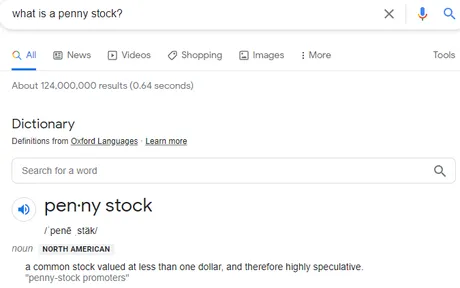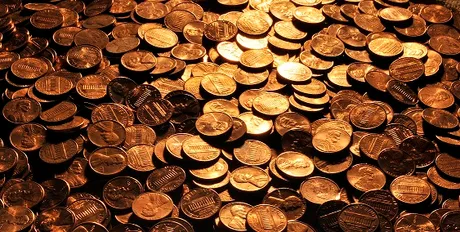
STONKS
There's obviously a big difference between stocks and crypto (even if VCs wrongfully view them as similar investment vehicles). In crypto, it's possible for the community itself to be in charge, whereas a stock will always be controlled by a board of directors. Sure, stocks have shareholder voting just like DPOS, but it's not really the same.
Crypto also can't patent anything or protect their IP from being used by other cryptos. Luckily that's kind of the point. At the core, both of these systems are diametric opposites, but no one focuses on the differences, only the similarities to make sense of it and to make some money in the process.
When we project our knowledge of one thing onto another thing sometimes that can be helpful, but we are also bound to make mistakes. The Devil is in the details.
Small cap stocks and crypto are even more dissimilar.
What even is a "penny stock"?

A common stock valued at less than one dollar.
Even that statement makes like zero sense to me.
Truth be told I don't know a whole lot about the stock market.
I simply don't care.
I have no interest in stocks.
I'm a crypto kid for life.
So that's the first difference.
A penny stock, unsurprisingly by definition, is valued in pennies, not dollars. But in crypto the token price is completely irrelevant and arbitrary. The token might be valued at $10,000, but if there are only 100 tokens total that's a $1M market cap, which is very obviously "penny stock" adjacent.
A penny stock refers to a small company's shares that typically trade for lower than $5 per share. Penny stocks are usually considered high-risk investments due to their low price, lack of liquidity, small market capitalization and wide bid-ask spread.
Here are some similarities, sort of........
Even Hive could arguably be called a penny crypto by this definition, but definitely all the tokens on HiveEngine qualify even further. My favorite penny crypto's are all in the LEO ecosystem (LEO/CUB/POLYCUB). Each one of these projects has less than a $5M market cap.

lack of liquidity, small market capitalization and wide bid-ask spread.
Here we see more differences.
DEFI has made huge developments that curb all of these weaknesses in an insane way that the world doesn't respect yet. LEO/CUB/POLYCUB have extremely deep liquidity. LEO/CUB/POLYCUB have a bid-ask spread of $0. How is this accomplished? AMM yield farming. All coins in the liquidity pools (of which there are many) are for sale at the fair market price. I can't reiterate enough how much of a huge advantage this is.
Penny stocks can't compete with crypto. These are facts. If I want to buy or sell 1% of all LEO/CUB/POLYCUB right now this second, I can do it instantly. You can't do that with a penny stock. The liquidity simply isn't there.
Are there rules for how many shares are printed?
https://www.investopedia.com/terms/p/pennystock.asp
No Minimum Standards
Stocks on the OTCBB and pink sheets do not have to fulfill minimum standard requirements to remain available for sale through OTC exchanges. Once a company can no longer maintain its listing position on one of the major exchanges, the company can move to one of the smaller OTC listing exchanges. Minimum standards can act as a safety cushion for some investors. When a company is not subject to higher standards, investing in that company becomes much riskier.
SEC-regulation vs SELF-regulation
Another big difference between stocks and crypto is the way in which they are regulated. The Securities Exchange Commission regulates stocks. Crypto by design is self-regulating. The code regulates itself according to the programming. Outside influence can't force the network to do anything it wasn't programmed to do.
Signs of Fraud
Though there is no fool-proof strategy for knowing which penny stocks are fraudulent, the SEC recommends that investors heed the following warning signs in a company's record: SEC trading suspensions, large assets but small revenues, financial statements containing unusual items in the footnotes, odd auditing issues, and large insider ownership.
This is a double edged sword.
Crypto not being regulated by a "trusted" institution means all kinds of crazy stuff can happen. The DEFI craze created a rug-pull event every single day, and it was still worth it to throw money at everything because so many things were going 10x or more within days.
If the code and consensus of crypto are good, then the regulation is good. However, it's hard to know how it works without extensive research. That's time that most people don't have, so they just throw money at everything and hope for the best.
Meanwhile, penny stocks also have less regulation. If I'm being honest it still doesn't make sense why the value of a share is less than $1. Can't they just print less shares to make the company look more legit? I dun get it.
Multiple events can trigger the transition of a penny stock to a regular stock. The company can issue new securities in an offering that is registered with the SEC, or it can register an existing class of securities with the regulatory body.
Safer stocks are categorized by more regulations.
Funny because safer cryptos are categorized by less regulation. Just look at Bitcoin. It's the most basic crypto ever, which is what makes it so safe. There are no attack vectors because what Bitcoin does is a very small subset of what smart-money can do.

Small companies and startups typically issue stock as a means of raising capital to grow the business. Although the process is lengthy, issuing stock is often one of the quickest and most effective ways for a startup company to obtain capital.
This is the ultimate difference between penny stonks and crypto.
We have to ask ourselves, why does the penny stock exist in the first place? The penny stock exists to funnel money into the company so it can scale up. The company is trading ownership in exchange for funding to scale up. In theory if everything works out everyone wins.
But why is a penny crypto created?
@khaleelkazi isn't out here begging people to invest in LEO. Guy is basically retired in his early twenties and just doing this for fun. He want's to build something cool that helps the entire community. Generating capital to scale up is a secondary objective. Khal is ready to hire 20 devs right now. He doesn't need your money. This shit is happening no matter what the market cap is. Huge huge difference that is constantly overlooked.
Again, this is the ultimate difference between crypto and stocks. Crypto IS money. Crypto IS self-funding and self-regulating and automatically delegates power out to the community that owns the tokens (especially DPOS governance). It's hard to see it now, but the real power of these differences is really going to emerge in five or ten years. Eventually stocks are not going to exist because crypto is basically superior in every way if implemented correctly.
Conclusion
While everyone is focused on the similarities of crypto and stocks (number go up!) and trying to generate wealth for themselves with this knowledge, the real power is in the differences. Crypto can not be regulated by the SEC by design. That's the entire point. It can't be banned. No, they can't shut off the Internet. That's not real. Billionaires aren't going to lose everything just to fuck you over. You aren't that special.
Small market cap cryptos in DEFI have near infinite liquidity and a zero point spread between bid and ask price due to the magic of automated market making. The ability to earn massive yields for providing liquidity to the market is a thing of beauty.
Most importantly, open source crypto is not a competition. Bitcoin gets value for free via AMM farming. Billions of dollars are provided to Bitcoin in liquidity across all the EVM chains. What does Bitcoin give back to these network? Nothing, and also everything. Bitcoin is a store of security. Connecting a token to Bitcoin via AMM adds security to the other token. All these networks are synergizing together, not competing like the corporate world does.
The biggest mistake we can make in crypto is wrongfully projecting cutthroat capitalism onto these open source networks that literally can't patent any of the IP by design. This is not a competition. WAGMI.
Posted Using LeoFinance Beta
Return from Penny Stock vs Penny Crypto to edicted's Web3 Blog
